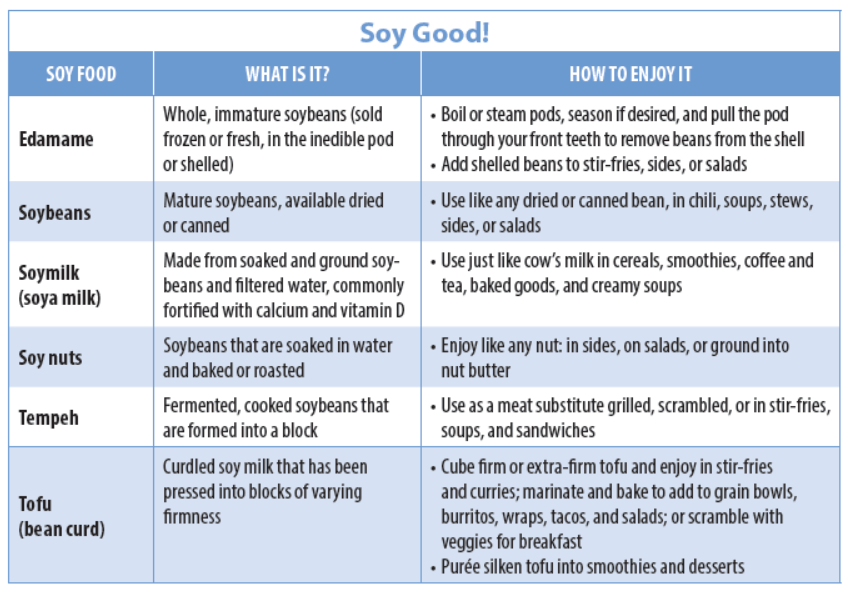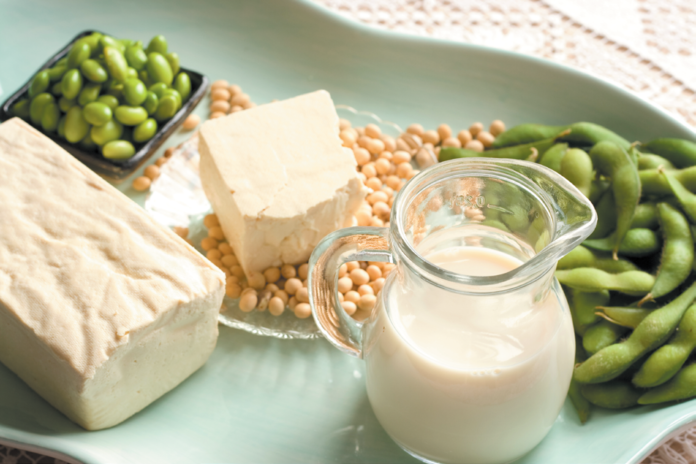Soy foods—like edamame, tofu, soymilk, and tempeh—are nutrient-rich, easy to use, and an excellent source of sustainable plant-based protein. If you’re unfamiliar with these foods, think they’re bland and unappealing, or even harbor a few concerns about soy food safety—it’s time to take a closer look.
Big Benefits, No Risks. Soy protein is equivalent to animal protein in amino acid make-up, and it comes with health-promoting fiber, phytochemicals, omega-3 and omega-6 fatty acids, vitamins such as B6, thiamine, and folate, and minerals including calcium and iron. Replacing less healthy choices—like red meats, refined carbohydrates, and sugar-sweetened beverages—with soy foods is good for heart health, and emerging research associates higher intake of soy food with a greater variety of health-promoting bacteria in the gut microbiome.
Soy contains high levels of isoflavones—plant compounds that are similar to estrogen. This has raised concerns that consuming soy might increase risk for breast and prostate cancers. In fact, says Karen Collins, MS, RDN, nutrition advisor for the American Institute for Cancer Research (AICR), “evidence does not support any increase in cancer risk related to soy foods.”
Research from Tufts University found that, after nine years, the highest intake of isoflavones in women with hormone-receptor-negative breast cancer was associated with a 21 percent lower rate of death from any cause than the lowest intake. “While our findings should not be interpreted as a prescription, they indicate soy foods may potentially have a beneficial effect and increase survival in women with hormone-receptor-negative breast cancer,” says lead author Fang Fang Zhang, MD, PhD, a cancer epidemiologist and associate professor at the Friedman School. No associations (positive or negative) were found for women with hormone-receptor-positive breast cancer or for women who received endocrine therapy.
The idea that soy intake may “feminize” men has also been disproven. A meta-analysis of clinical studies published earlier this year showed no significant effects of soy protein or isoflavone intake on male reproductive hormone levels.
One study suggested high intake of soy foods (two or more servings a day) may increase risk of thyroid problems in women, but the vast majority of studies agree intake of soy foods as part of a varied diet is not a risk for thyroid issues. (If you are being treated for hypothyroidism, follow the advice of your healthcare professional.)
Swap in Soy Foods. Whole, minimally processed soy foods (like edamame, soybeans, soy nuts, unsweetened soymilk, tofu, and tempeh) are the best choices for replacing some of the animal protein you would normally eat. More highly processed products like soy meats, cheeses, and yogurts may be options as well, especially for vegetarian and vegan diets, but watch out for high sodium or added sugar content in these products, as well as in soy sauce, miso, and soy-based ice creams and other desserts. Be aware that soy protein or isoflavone supplements are not proven beneficial, and also that the addition of soy protein to an otherwise unhealthy food does not make it a healthy choice.

Try these soy tips:
- GET YOUR PROTEIN. Soy foods are a very high-quality plant protein, equivalent to animal proteins.
- DON’T WORRY. Research suggests whole, minimally processed soy foods are not only safe, but also have potential health benefits.
- SWAP FOR SOY. Try nutrient-rich soy products, like tofu, edamame, and soybeans, in place of animal proteins like meat and poultry.
























